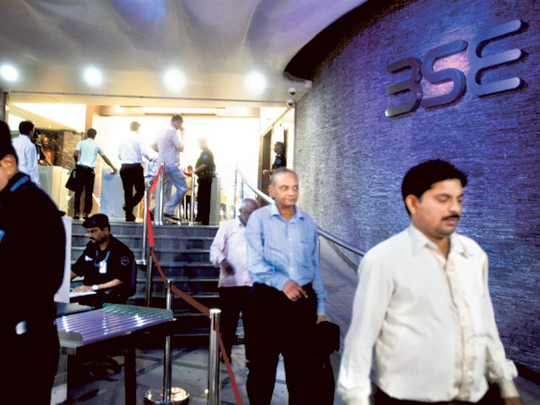
Mumbai: Offshore investors will buy more Indian equities after the nation opened its retail and aviation industries to foreigners, accelerating the highest fund inflows in Asia this year, Bajaj Allianz Life Insurance Co said.
Prime Minister Manmohan Singh approved on September 14 plans to allow overseas retailers such as Wal-Mart Stores to own 51 per cent of supermarket chains, and lifted a restriction on airlines selling stakes to foreign carriers. The benchmark BSE India Sensitive Index, or Sensex, rose 0.9 per cent to 18,625.09 at 9.55am, headed for its highest close in 14 months.
Foreign funds have bought a net $12.8 billion (Dh47 billion) of Indian shares this year, the most among 10 Asian markets outside China tracked by Bloomberg, on speculation the government will revive plans to boost an economy growing at the slowest pace in three years. The investment measures, together with a September 13 move to end a 14-month freeze on diesel prices, may spur the central bank to ease monetary policy after a review on Monday, said Sampath Reddy, chief investment officer at Bajaj Allianz in Mumbai.
The announcements are “very, very positive in terms of fund flows, and in improving sentiments of foreign investors toward India,” Reddy, who manages $7.5 billion at a venture with Europe’s biggest insurer, said by phone on September 14. “My gut feel is that the RBI will follow with a rate cut.” Reddy said he will add to his holdings of retailers, without naming any stocks.
Sensex target
Citigroup raised its June 2013 target for the Sensex by 8 per cent to 19,900 on increased foreign inflows, Aditya Narain, head of India research, said on Monday. Deutsche Bank AG increased its year-end target for the 30-stock gauge by 11 per cent to 20,000, according to a report on Monday.
The Sensex has risen 21 per cent this year, the second-best performance among benchmark measures in countries with at least $1 trillion in stock market value, data compiled by Bloomberg show. The gauge jumped 4 per cent last week, helped by the US Federal Reserve’s announcement of a third round of stimulus measures and a September 13 increase in diesel prices.
Pantaloon Retail India Ltd, the nation’s top supermarket operator, surged 16 per cent, the most since May 2009, to Rs183.8 in Mumbai. Shoppers Stop Ltd. jumped 13 per cent to Rs356, the steepest gain since February 2. Jet Airways (India) Ltd, the nation’s biggest carrier, extended a seven-day rally, gaining 1.7 per cent to Rs375. Budget carrier SpiceJet Ltd. soared 11 per cent to Rs38.4.
Increased weighting
Global funds “have to raise” their weighting on Indian equities after the investment proposals, Taina Erajuuri, a fund manager in Helsinki at FIM Asset Management overseeing about $1.2 billion of emerging-market assets, said by e-mail on September 14. “Otherwise, they will underperform. Stocks will go up on the back of the measures.”
The Sensex trades at 14.7 times estimated earnings. While that’s 29 per cent more than the MSCI Emerging Markets Index’s valuation of 11.3 times, it’s still below the 16.2 multiple the Sensex traded at in February, data compiled by Bloomberg show.
Singh was the architect of India’s 1990s economic opening and has been prime minister since 2004. The Sensex soared a record 17 per cent on May 18, 2009, prompting exchanges to halt trading for the rest of the day, after he won a second term on the promise of higher economic growth and more jobs. The rupee jumped 3 per cent that day.
Downgrade threat
Still, Singh’s efforts to implement policies to revive investment amid threats from Standard & Poor’s and Fitch Ratings to downgrade India’s credit rating have been derailed by his fractious ruling coalition and corruption allegations. Inflation near 7 per cent has limited room for interest-rate cuts. RBI Governor Duvvuri Subbarao will leave borrowing costs at 8 per cent for a third meeting on Monday, 35 of 39 economists said in a Bloomberg News survey.
“The Reserve Bank could be under political pressure to act on September 17, but I believe it will pause in this meeting and then re-look at its decision in the next policy,” Upasna Bhardwaj, an economist at ING Vysya Bank Ltd in Mumbai, said on September 14. The announcements that day “will bring in more capital flows and support the rupee.”
The rupee may advance to 53.50 or 53 against the dollar, said Bhardwaj. The currency gained 0.9 per cent to 53.8275. It jumped to a four-month high of 53.6550 earlier. The rupee rallied 2 per cent on September 14.
India’s economy, Asia’s third-largest, grew 5.5 per cent in the June quarter after expanding 5.3 per cent in the previous three months, the least in three years. Growth could slow to 5 per cent annually if the policy logjam persists, Singh said in his address to the Planning Commission on September 15.
Political opposition
The changes in ownership rules don’t require approval by parliament. Still, Singh’s ally Mamata Banerjee, the chief minister of West Bengal state, on September 14 gave the government 72 hours to reverse the steps, Press Trust of India reported. Her party, the Trinamool Congress, may consider pulling out its ministers from the ruling coalition, PTI said on Sunday, without citing anyone. The Bharatiya Janata Party, the main opposition party, and its partners, have called for a countrywide strike on September 20, according to the news service.
“If the government doesn’t succumb to the pressures of the opposition and its allies and implements these things, it will be a great move,” Shishir Bajpai, senior vice president at Mumbai-based IIFL Wealth Management Ltd., which oversees $1.8 billion in stocks, said by phone on September 14. “After a long time, there’s something positive. I hope the measures don’t remain on paper.”












